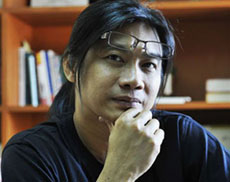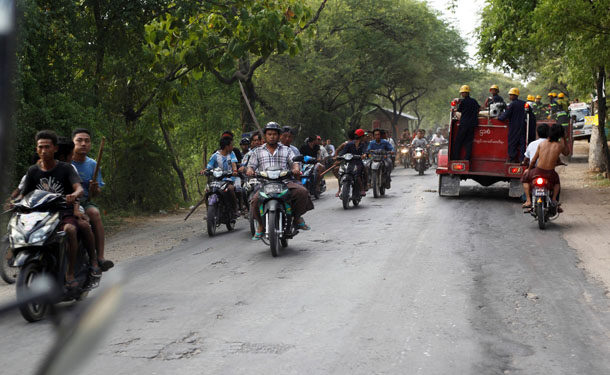In 2012, during my second trip to Myanmar after spending 24 years in exile, I made a point of visiting Mandalay. For me, traveling to the country’s second-largest city was a bit like going on a pilgrimage: It was here, after all, that King Mindon established the Yadanabon newspaper (known in English as The Mandalay Gazette), one of Southeast Asia’s first newspapers.
King Mindon, Myanmar’s penultimate monarch, was an enlightened leader who understood that the best way to withstand Western influence was by embracing some of the same institutions that made the West so strong. Famously, he declared that the press was to have free rein when it came to reporting on affairs of state.
“If I do wrong, write about me,” he said. “If the queens do wrong, write about them. If my sons and my daughters do wrong, write about them. If the judges and mayors do wrong, write about them. No one shall take action against the journals for writing the truth. They shall go in and out of the palace freely.”
But it wasn’t just the press that benefitted under King Mindon’s rule. Although he took his traditional role as the protector of Buddhism seriously, he also respected other religions. Under his reign, Christians and Muslims were allowed to build places of worship and practice their faiths freely. Muslims and Portuguese served in the royal army and custom’s department, and were allowed to marry Myanmar women.
Many Muslims were royal bodyguards, couriers, interpreters and advisers in the royal court. It is said that the king, who hosted the Fifth Great Buddhist Synod in 1872, even helped to build a hostel in Mecca for Muslim pilgrims from his country.
Thais descended from prisoners of war after the sacking of Ayutthaya also lived on peacefully in Mandalay. And to impress the British who occupied lower Myanmar, Mindon sent some of his sons to study in an Anglican missionary school.
In more recent times, Mandalay residents owed gratitude to U Razak, a minister for planning and education who died along with independence hero Aung San. A former headmaster of Mandalay National High School who helped build Mandalay College (now Mandalay University), U Razak, respected Muslim and a scholar of Pali and Buddhism, was a true national hero.
Mandalay also has an important place in more recent history. In 1988, it was a major center of the pro-democracy uprising that sought to overthrow the military dictatorship. The city produced many well-known activists, but Buddhist monks played an especially prominent role in opposing the country’s rulers. When the generals refused to respect the results of elections held two years later, the monks earned the admiration of the entire nation by rejecting alms from military families—a powerful gesture that showed the ruling regime lacked all legitimacy. For their defiance, many monks were arrested in raids on monasteries and tortured in prison.
All of this makes it especially depressing to realize that Mandalay is now better known as a hotbed of religious intolerance, thanks to the acts of a few extremists intent on stirring up trouble as a way of undermining Myanmar’s efforts to restore democracy.

U Wirathu, the monk who calls himself the “Burmese bin Laden,” is no heir to Mandalay’s noble past. Although he is the abbot of one of the city’s largest monasteries, he does not spread the Buddha’s message of peace, but propagates a gospel of fear and hatred directed at Myanmar’s Muslim minority. But it comes as no surprise that his hateful incitement has gone unchecked: Photographs on social media sites have shown him receiving alms from hard-line leaders of the ruling Union Solidarity and Development Party (USDP) and others who unashamedly proclaim him a true defender of Buddhism.
The violence that shook Mandalay in early July followed a pattern that we have seen many times in the past two years, and which we will no doubt see many more times between now and next year’s crucial elections. Two Muslim men were accused on social media of raping their Buddhist maid, and after a period of growing tension between the city’s Buddhists and Muslims, all hell broke loose.
Although there was relatively little loss of life or damage to property in this latest incident, reporters on the ground in Mandalay say they feel there may be worse to come.
Indeed, many observers of Myanmar’s dirty and often deadly politics are growing increasingly wary of the direction the country seems to be taking as it heads toward elections that will decide its fate for years to come. As one ethnic leader told me, the current government—which came to power through a rigged vote in 2010—“doesn’t have the courage” to hold free and fair elections in 2015.
The fear is that instability will be used as an excuse to spare the military-backed USDP another resounding electoral defeat like the one it suffered at the hands of the National League for Democracy (NLD) in by-elections held in 2012. (The NLD boycotted the 2010 election.) If that happens, Myanmar’s reforms could rapidly unravel, and the country would return to a political impasse that would only benefit hard-liners from the former regime who preferred the pre-2011 order.
It seems that the leaders of the old regime had calculated that five years of relatively relaxed rule would be enough to win their party another lease on life. Now that their time seems to be running out, however, they are getting more desperate and more willing to resort to their tried-and-true tactics of violence and divide and rule to perpetuate their hold on power.
After a brief period of hope, when the administration of President U Thein Sein made all the right moves—releasing political prisoners, lifting media censorship and suspending the unpopular Myitsone hydropower project, among others—it is easy to despair as the country appears to be sliding back into the repressive habits of the past. With activists and journalists being locked up again, the sense of déjà vu is almost oppressive.
But at such times as this, it is important to remember that Myanmar’s history has not been entirely one of woeful misrule. Mandalay’s proud past, for instance, points to other possibilities. If Myanmar once had leaders who valued press freedom and religious tolerance, there’s no reason it can’t have them again.
This article first appeared in the August 2014 print edition of The Irrawaddy magazine.
















